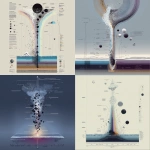Explore the Best AI Image Gallery

AI-Generated Images: Reshaping the Marketing Landscape
The marketing world is on the cusp of a transformative shift with the emergence of AI-generated images. These images, created by sophisticated algorithms, offer unprecedented possibilities for marketers to enhance their campaigns, personalize content, and engage audiences in novel ways. But this rapid evolution also raises important ethical questions that need careful consideration.
The Potential Power of AI Images in Marketing
AI image generation presents a plethora of exciting opportunities for marketers across diverse sectors:
- Enhanced Creativity and Efficiency: Marketers can leverage AI to generate visually compelling content quickly and efficiently, freeing up valuable time and resources.
- Personalized Experiences: AI algorithms can tailor images based on user preferences, demographics, or browsing history, creating personalized marketing experiences that resonate with individual consumers.
- Cost-Effectiveness: Replacing the need for expensive photography studios or graphic designers in certain scenarios, AI image generation can significantly reduce marketing costs.
- Dynamic and Interactive Content: Imagine marketing campaigns where images adapt in real-time based on user interactions or market trends. AI opens up possibilities for dynamic and engaging content experiences.
Real-World Applications of AI Images
The applications of AI-generated images are already being felt across various marketing domains:
- Social Media Marketing: Creating eye-catching visuals for social media posts, stories, and ads to capture audience attention.
- E-commerce Marketing: Generating product imagery, lifestyle shots, and 3D models to showcase products in a compelling way.
- Content Marketing: Illustrating blog posts, articles, and other content with relevant and engaging visuals generated by AI.
- Advertising Campaigns: Designing unique and personalized ad creatives that target specific consumer segments.
Ethical Considerations and Responsible Use
While the potential of AI-generated images is vast, its crucial to approach this technology with a strong ethical compass:
- Transparency and Disclosure: Clearly identify AI-generated content to avoid misleading consumers.
- Bias and Fairness: Ensure that AI algorithms are trained on diverse datasets to prevent the perpetuation of harmful biases in generated images.
- Copyright and Intellectual Property: Address legal complexities surrounding ownership and copyright of AI-generated content.
- Misuse Potential: Be vigilant against the potential for malicious use, such as creating deepfakes or spreading misinformation.
Future Trends in AI Image Generation
The field of AI image generation is constantly evolving. We can expect to see:
- Increased Realism and Detail: AI algorithms will continue to improve, generating images with even greater realism and detail.
- Enhanced User Control: Marketers will have more control over the creative process, able to fine-tune AI-generated images with greater precision.
- Integration with Other Technologies: AI image generation will likely be integrated with other technologies, such as augmented reality and virtual reality, to create immersive marketing experiences.
Conclusion
AI-generated images are poised to revolutionize the marketing landscape, offering exciting opportunities for creativity, efficiency, and personalization. However, it is essential to navigate this transformative technology responsibly by addressing ethical concerns and ensuring its ethical and sustainable use. As AI continues to evolve, marketers who embrace its potential while remaining mindful of its implications will be best positioned to thrive in the future.


](https://images.ai-img.art/thumbnails/150/266c825c7f03beff90a8a60e36207b8240cdf722eb1cf5db26e8adb51b992287.webp)
](https://images.ai-img.art/thumbnails/150/6650b0d98c6fec81df8bdfb569e0033970b46a653d188dde42417e624901493f.webp)





](https://images.ai-img.art/thumbnails/150/bda14621f89269b376d6681934fea3c4af8c5f8593b80e1cb25cdf0047f98621.webp)







](https://images.ai-img.art/thumbnails/150/10ab1dbb1358d3dbba41472a395400bd9daf5cba3f5c8841970b4110820d5a15.webp)













](https://images.ai-img.art/thumbnails/150/2f4f685af05f9526e1ac2f05f53dbb1d97bf8a65f6a41c6e67059c5ed2aa871f.webp)





](https://images.ai-img.art/thumbnails/150/58fa7e3c741db40e9e61e20410c8d5675b11efb625df109812cc768f9b17b717.webp)



](https://images.ai-img.art/thumbnails/150/b814eba984b490e7f87095501b4c13b17e89f8960f044f09fbf2053969d9be29.webp)
](https://images.ai-img.art/thumbnails/150/f7e46d83151e744219d4886ca1329794d3e9d5071649abea0b2996cb34c3c77c.webp)
](https://images.ai-img.art/thumbnails/150/230fb1adf4241373591167585daecc4556f4c58c4d0dc33638c62b1c60c1b72a.webp)



](https://images.ai-img.art/thumbnails/150/396b1c442fa4d576e35f871ba0f3c7e52bb62c6bcee69082dbcb816a5fd3aa8c.webp)

